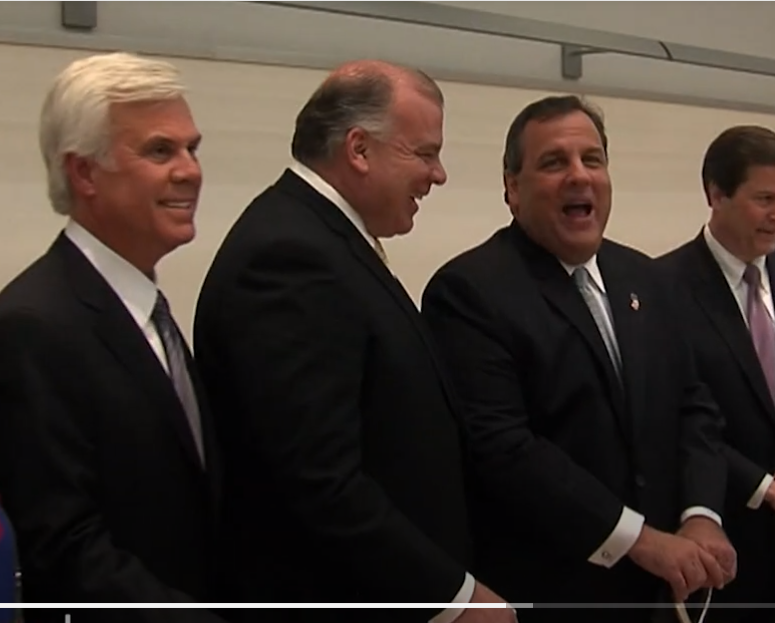The Women Who Saved New Jersey from Utter Political Ignominy


The source spoke as though he was sitting on a stool in a tavern with sawdust on the floor, only this was the COVID-19 era, so only the voice came through the phone, atmospheric and suggestive of grim proximity but in actuality occupying nowhere.
It was arguably the most important presidential election since 1860, or rather, it seemed like the country could revert farther back in time than even then, and yet the source – determinedly a member of the New Jersey political establishment, maintained his focus on the 2021 post-legislative election cycle.
Steve Sweeney was likely to serve another term as senate president, the source croaked. No one else had sufficient political capital to challenge him in the caucus. The news was spoken with the deadness of certainty, and the reasoning seemed sound. Senator Joe Cryan might have been a challenger to the throne Sweeney has occupied since 2009. So too, Senator Joe Vitale might have taken a shot. But both men won’t move, the source said, as long as Craig Coughlin remains speaker. Cryan and Coughlin are tight, and Vitale serves as the senator of the same district occupied by his slate mate assemblyman.
What about Essex?
Well, Essex got the state chairmanship of the Democratic Party when LeRoy Jones cut the deal last year with John Currie, who’s scheduled to leave in June of next year to allow Jones to succeed him. Plus, Essex has a U.S. Senator in Cory Booker, the budget chair in Eliana Pintor Marin and the lieutenant governor in Sheila Oliver.
So Hudson might…
Well, Hudson has Senator Bob Menendez, and the rest of the state and all the organizations went out there and backed him when he was on trial and secured his reelection, and that should be enough to mollify Hudson, shouldn’t it, or so ran the reasoning, and as for Bergen – Menendez was practically Bergen now. Plus, Bergen had Budget Chairman Paul Sarlo and Senate Majority Leader Loretta Weinberg, and if Weinberg were to retire someone else from Bergen could take that role, or teresa Ruiz could, for example, and Bergen could get an injection of power elsewhere.
So Sweeney – who had gotten Chapter 78 done for the teachers in a master stroke that squashed a bitter past between himself and the labor union – looked well positioned to extend his reign, in the words of the late Nick Acocella, as New Jersey’s imperial senate president. That meant Coughlin would again be speaker, which meant Murphy – who in an interview with Politico’s Matt Friedman already opted out of going to a Biden Administration, in the event that Joe Biden defeats President Donald Trump – would again be governor.
He’d get challenged by the winner of the Republican Primary tilt between Doug Steinhardt and Jack Ciattarelli, but Democrats outnumber Republicans in this state by well over a million people, in part the legacy of former Governor Chris Christie and Trump, and neither Ciattarelli nor Steinhardt has the public platform aggressively (and that’s putting it mildly) possessed by Christie in the lead-up to his take-down of moribund incumbent Governor Jon Corzine. And Corzine barely lost that election.
So what it means is the Democratic Party, as it has gnashed its collective teeth and condemned Republicans and their cowardly prop-up of a nativist president, will likely emerge from this season with the same three guys intact as the stewards of state government; three guys who reinforce the notion that in New Jersey, in order to wield “power,” one must either be competent and beholden to a boss, or radiate routine shades of incompetency and be relatively independent of the machine.
It added up to one thing: three white dudes running a state as diverse as anywhere in the country at a time of national domestic crisis.
If it seemed insidious, or at least indicative of the insulation of the party from reality, it also explained the stagnant quality of the state’s politics – “swimming in filth,” as one state senator described his own condition to InsiderNJ this week – and also reflected, perhaps, why the national party had advanced – even in the face of evidence that the former vice president had slipped considerably – the candidacy of Joe Biden as a presidential candidate. Moreover, it underscored why Trump felt comfortable – with the help of his political director Bill Stepien, former political director of Chris Christie – leaning on New Jersey to supply him with the potential for at least one steady and ongoing national-sized narrative.
It explained, too, beyond the fact that New Jersey does not compete as a general election battleground state in an arena occupied by Pennsylvania, Michigan, Ohio, Florida and Wisconsin, why that vocal street presence otherwise known as Black Lives Matter and its adherents reflected a will overwhelmingly anti-establishment more than merely anti-Trump, let alone pro-Biden. It spoke to a disconnected Democratic Party establishment routinely and probably mostly unknowingly breathing life into a pre-1860 presidential agenda mustered by incumbent Trump.
If the state’s political establishment, for the most part, seemed oddly detached from real people, cocooned in itself and characterized by gloomily sociopathic procedures, it was originally by design. New Jersey is a state formulated by boss rule, seldom contravened and sometimes – but for a grassroots anomaly like Newark’s Ras Baraka – only when someone rich enough to convince the party organizations don’t actually have to work for the protection they claim they offer the public, comes along and simultaneously convinces the bosses that he lacks sufficient experience to actually be a threat.
Nowhere was the insipid quality of the state’s politics more tangible than in CD-7, where former lobbyist U.S. Rep. Tom Malinowski (D-7) faced a challenge by a hail Mary-throwing state Senate Minority Leader Tom Kean, Jr. (R-21). With apparently little to offer, the two candidates proceeded to shower a COVID-19-ravaged district in dung, the overt obscenity of the attacks outdone only by the slumbering disengagement of the candidates.
In one ad, shot from above at the outset, Malinowski – and this is not meant as anything other than a bland treatment of absurdity – actually resembles a human golf ball, evidently to subconsciously transmit his comfort level with a favorite recreational pastime here. The camera pans to reveal a face beset by discomfort, almost as if the physical act of standing in the district is spiritually taxing. Then there’s Kean. Running a campaign devoid of substance, he looks hollowed out by his time in Trenton, the sluggishness of his accumulated Statehouse performances contrasted only by the blinding speed with which he has run away from the media during the course of this meaningless campaign. He has run, in fact, like someone who learned on that elevator in his 2006 race that his best shot still might be to dodge the press, such as it is in 2020; as though the specter of a lively fourth estate still abided in the embers of what exists now. Ghostly white in his ads, he is a candidate plagued by ghosts.
This is supposedly one of the marquee matchups in the state, and it feels like the two people running have sufficient energy only to perform an embalmment of the entire district. The very nearly last standing human pillar of an old breed of aristocrats who make their living from government and its connections by gently rebuking government, Kean seems to be running into the same combine that dispatched fellow Mayflower passengers Rodney Frelinghuysen and Leonard Lance (both 2018 casualties). His is an exhausted attempt to appear game in the face of the Trump maelstrom that already ravaged his party in this state. If he radiates as much liveliness as his rival, Malinowski can at least somewhat righteously plead his own weariness with the Trump era. Kean – supposedly the voice of a kinder, gentler GOP, is finally an enabler.
“I’m disappointed in Kean,” said Shelley Brindle, mayor of Westfield, who three years ago mowed down the decayed semblance of a sedate local GOP party organization, which could not withstand the damage done by Trump in an affluent community conceived as a suburban haven of education and elitism.
If a morass of monotony swallowed both candidacies, the same could not be said of CD2, where during the Governor Christie era, Van Drew – then a state senator – survived by making himself that critical go-to vote when Christie needed help with his budgets. The partnership was so strong, Christie in 2013 left fellow Republicans in Van Drew’s and Sweeney’s districts dangling and instead campaigned up north alongside his fans Essex County Executive Joe DiVincenzo and state Senator Brian P. Stack. The breach was so stinging, caucus members rejected Christie’s choice to lead the caucus on the other side of the election and instead backed Kean, who had carefully recruited Republican candidates in LD1 and LD3 who might ride Christie’s coattails into office.
It was a mild rebuke – one, however that would become the first of a series that ultimately caused what could only be described as Christie’s political downfall. At that moment, losing the leadership of the senate minority seemed acceptable – even almost comically irrelevant within the larger scheme of Christie’s political intentions.
Van Drew had backed him.
So had Sweeney.
So had George Norcross III, the Democratic Party boss from South Jersey.

The relationship with Van Drew was more politically significant, given the connective tissue of Van Drew to the heart of establishment Democratic Party power in this state, than the relationship with young Kean, who was perceived to be someone who would line up behind the leader of the party, an assessment, in fact, proved by Kean’s future 2020 congressional candidacy, when he slogged in under Trump.
If the relationship with Van Drew worked for Christie, and gave Van Drew what to that point of his career was one of his biggest election night victories in 2013 (when Christie occupied the top of the opposition ticket) the template was in place for Trump with Van Drew.
The fact that the Murphy administration was going after the Christie-Norcross nexus after having exposed $11.5 billion in tax breaks to the Norcross network, intensified the environment around Van Drew switching parties.
Trump needed a nifty story line to push back against impeachment at the end of last year, and New Jersey – in the form of Van Drew – was only too happy to oblige.
But the appearance of an establishment done deal died in the CD2 Democratic Primary, enlivened by anti-establishment voters and irritated, Benedict Arnolded partygoers, when educator Amy Kennedy defeated the same political machine that enabled Christie, and whose rank and file members (perhaps unwittingly in some cases?) had enabled Van Drew.
If Mikie Sherrill in 2018 gave the state something more than the same retread of white guys without

service records and no real evidence of fighting pluck while the world careened toward a pandemic, Kennedy had become the 2020 torchbearer of such a campaign, one whose transcendent qualities (grounded within a culture of misogyny and cowardice) promised again to empower women; emerging from a place untrampled by that tired, kneading, time-to-make-the-donuts party establishment that had mostly empowered Christie during his eight years in office and appeared – on the strength of Van Drew’s action alone – willing to empower Trump.
Its presidential candidates (Christie 2016, Booker 2020) failed to penetrate the national consciousness, yet New Jersey insisted on making an indentation through the primacy of its backroom deal-making. When Trump built part of his fortune in Atlantic City, he pulled out, leaving that impoverished place once more without one of those financial anchors that was supposed to contribute to saving the people living in that hard luck gambling mecca.
On Thursday, a zombie staggered across the street outside the Hard Rock Hotel and Casino. Another source on the phone pushed back on the fixed structure of state politics, arguing that Senate President Sweeney was not cemented; the caucus would consider another direction.
Too much was happening out there.

In the meantime, women’s voices rose starkly on a landscape politically pockmarked with male depravity.
Perth Amboy Wilda Diaz, who toppled an administration beset by corruption, and fought the machine and fights a supposedly Democratic organization that wants her gone.
Christie Todd Whitman, former governor of the state of New Jersey, spoke out against a woman-abusing incumbent president of her own party – and (of course) got kicked in the teeth of it here.
Mikie Sherrill, who took on Frelinghuysen, who could do no better than roll his eyes at “Trump’s twitter feed” – that was a quote – ran him out of office.

Sue Altman, leader of New Jersey Working Families and a worthy heir to the equally engaged and fearless Analilia Mejia – aggressively challenged that part of the party teetering in a world of accommodating backrubs, massages, and helicopter pads.
A party that spends its time on golf courses and on island getaways furnished by political bosses, advancing tired candidacies and offering nothing except political power plays in the lead-up to COVID-19, could do little in the way of inspiring a fed-up electorate. If in the past the intertwined establishment of both parties could conspire to abandon women candidates, among them Barbara Buono, Susan Adelizzi Schmidt and Niki Trunk, it offered nothing now but a broken play and the howl of misogyny like an overfed gull flapping at a podium in Wildwood in winter.
The state felt, as always, like a plodding and ongoing version of an awful and rightly widely condemned 2014 movie called Exodus: Gods and Kings, in which minorities play secondary roles to bad white actors inexplicably cast as the heroes. The only difference, of course, was that, unlike an exodus, New Jersey was going nowhere fast; but for Amy Kennedy, who like Whitman and Altman and Sherrill, stepped up against the nexus of a decayed machine, and offered something far more than just one more variation on enduring and insufferable acquiescing male sycophancy as the country crumbled.









Leave a Reply